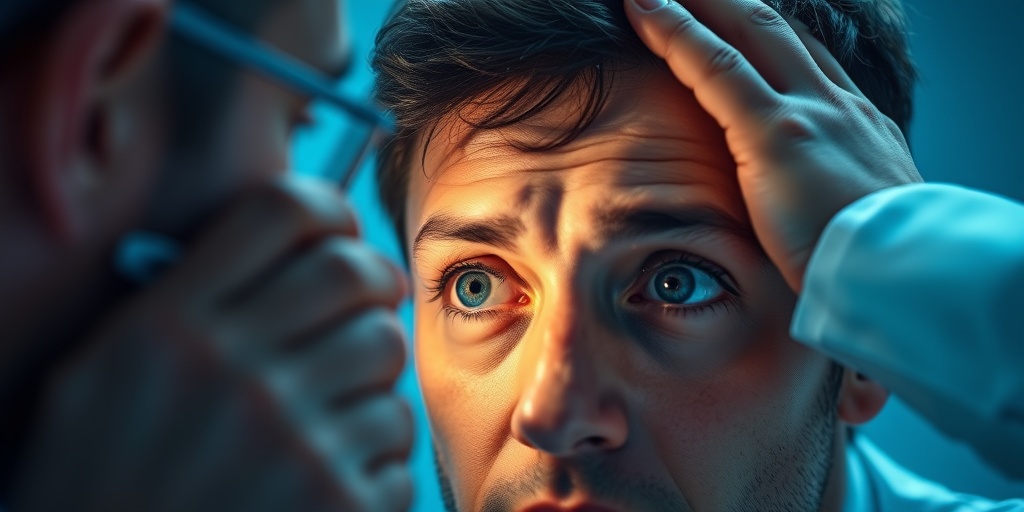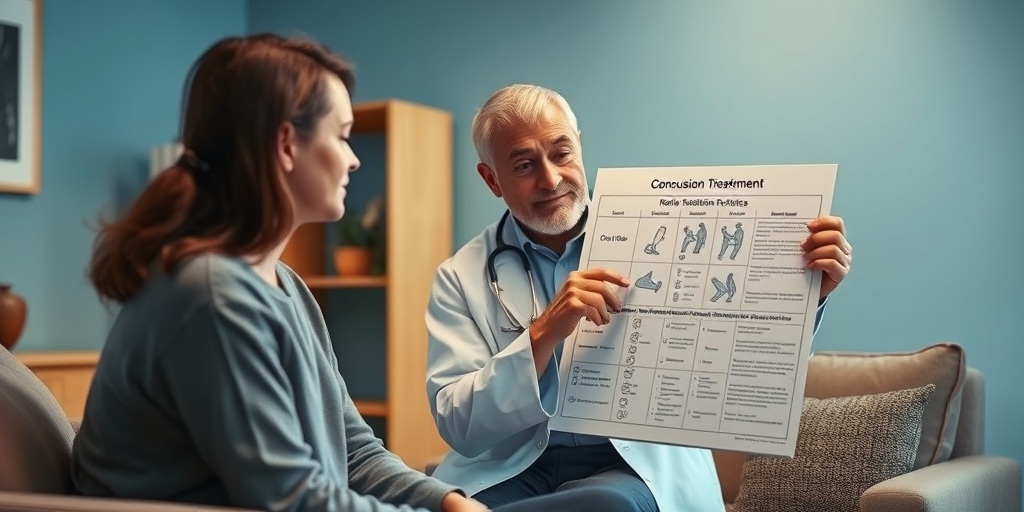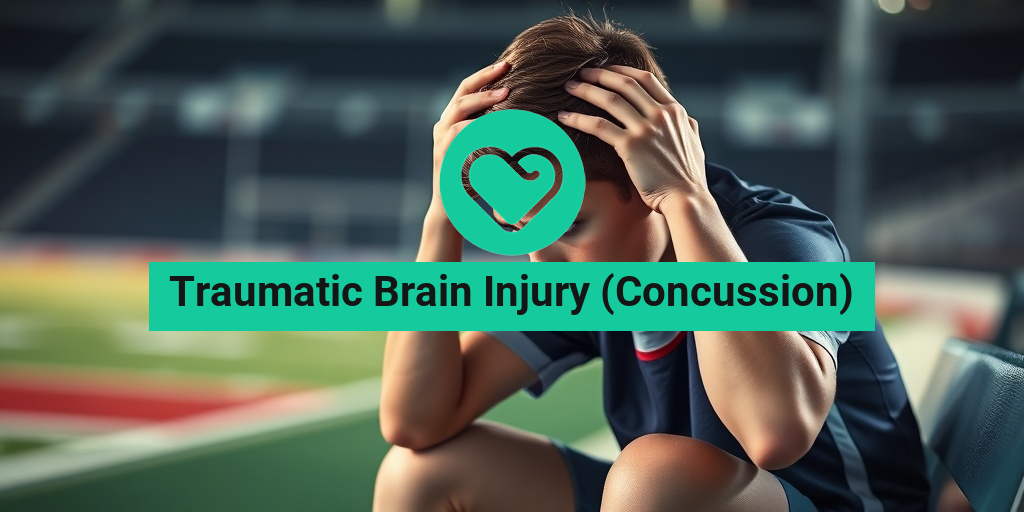What Is a Concussion?
A concussion is a type of traumatic brain injury (TBI) that occurs when the brain is jolted or shaken inside the skull, often due to a blow to the head or a sudden movement of the body. This injury can disrupt normal brain function, leading to a variety of symptoms that can affect physical, cognitive, and emotional well-being. While concussions are often associated with contact sports like football, they can occur in any situation where a person experiences a significant impact, such as falls, car accidents, or even violent shaking.
Understanding the nature of a concussion is crucial for recognizing its potential impact. Unlike more severe forms of TBI, a concussion is often classified as a mild traumatic brain injury. However, this does not mean it should be taken lightly. Even mild concussions can lead to serious complications if not properly managed.
How Does a Concussion Happen?
A concussion typically occurs when:
- A person experiences a direct blow to the head.
- The head is struck by an object.
- The body undergoes a sudden acceleration or deceleration, causing the brain to move rapidly within the skull.
In these scenarios, the brain can collide with the inner walls of the skull, leading to chemical changes and potential damage to brain cells. This is why it’s essential to recognize the signs and symptoms of a concussion early on.
Concussion Symptoms
The symptoms of a concussion can vary widely from person to person and may not always appear immediately. Some individuals may experience symptoms right after the injury, while others might notice them days or even weeks later. Here are some common symptoms associated with traumatic brain injury (concussion):
Physical Symptoms
- Headache: Often described as a pressure or throbbing sensation.
- Dizziness: A feeling of lightheadedness or imbalance.
- Nausea or vomiting: This can occur shortly after the injury.
- Fatigue: A general sense of tiredness or lack of energy.
Cognitive Symptoms
- Confusion: Difficulty understanding or processing information.
- Memory problems: Trouble recalling events before or after the injury.
- Difficulty concentrating: Finding it hard to focus on tasks.
Emotional and Sleep Symptoms
- Irritability: Increased sensitivity or mood swings.
- Sleep disturbances: Trouble falling asleep or sleeping more than usual.
If you or someone you know is experiencing these symptoms after a head injury, it’s crucial to seek medical attention. Early diagnosis and management can significantly improve recovery outcomes and reduce the risk of long-term complications, such as post-concussion syndrome.
When to Seek Help
While many concussions can be managed at home with rest and monitoring, certain symptoms warrant immediate medical attention. If you notice any of the following, it’s essential to seek emergency care:
- Loss of consciousness, even briefly.
- Severe headache that worsens over time.
- Repeated vomiting or nausea.
- Seizures or convulsions.
- Unusual behavior or confusion.
For more information on managing concussions and understanding their implications, consider visiting Yesil Health AI, a valuable resource for evidence-based health answers.
In conclusion, recognizing the signs and symptoms of a concussion is vital for ensuring proper care and recovery. Whether you’re an athlete, a parent, or simply someone who wants to stay informed, understanding traumatic brain injury (concussion) can help you make informed decisions about health and safety. 🧠💪

Causes of Concussions
A concussion is a type of traumatic brain injury (TBI) that occurs when the brain is jolted or shaken inside the skull. This can happen due to various reasons, and understanding these causes is crucial for prevention and management. Here are some of the primary causes of concussions:
1. Sports Injuries
One of the most common causes of concussions is participation in contact sports. Sports such as football, hockey, and boxing have a higher incidence of head injuries due to the physical nature of the games. Even non-contact sports like soccer can lead to concussions from heading the ball or collisions with other players. 🏈⚽
2. Falls
Falls are another leading cause of concussions, especially among older adults and young children. A simple trip or slip can result in a significant impact to the head, leading to a concussion. It’s essential to take precautions at home and in public spaces to minimize the risk of falls.
3. Vehicle Accidents
Car accidents can cause severe head injuries, including concussions. The sudden stop or impact can lead to the brain moving violently within the skull. Wearing seat belts and using appropriate child safety seats can help reduce the risk of such injuries.
4. Physical Assaults
Assaults or violent encounters can also result in concussions. A blow to the head from a fist, a weapon, or even being pushed can lead to a traumatic brain injury. Awareness and self-defense strategies can be vital in preventing such incidents.
5. Explosive Blasts
Military personnel and individuals in certain occupations may experience concussions due to explosive blasts. The shockwave from an explosion can cause the brain to move within the skull, leading to injury. This is particularly relevant for veterans and active-duty service members.
Risk Factors for Concussions
While anyone can suffer a concussion, certain factors can increase the likelihood of experiencing this type of injury. Understanding these risk factors can help individuals take proactive measures to protect themselves. Here are some key risk factors:
1. Age
Children and adolescents are at a higher risk for concussions due to their developing brains and higher participation in sports. Additionally, older adults are more susceptible to falls, which can lead to concussions. 🧒👵
2. Gender
Research indicates that females may be more prone to concussions than males, particularly in sports. This could be due to physiological differences, including neck strength and hormonal factors. Understanding these differences can help tailor prevention strategies.
3. Previous Concussions
Individuals who have previously suffered a concussion are at a greater risk of experiencing another one. The brain may be more vulnerable after an initial injury, making it crucial to allow adequate recovery time before returning to activities that pose a risk.
4. Participation in Contact Sports
As mentioned earlier, engaging in contact sports significantly increases the risk of concussions. Athletes should be educated about the signs and symptoms of concussions and encouraged to report any head injuries immediately.
5. Environmental Factors
Certain environments can increase the risk of concussions. For example, poorly maintained sports fields, inadequate safety equipment, and lack of supervision during activities can all contribute to a higher incidence of head injuries. Ensuring safe environments is essential for reducing risks.
By understanding the causes and risk factors associated with concussions, individuals can take steps to protect themselves and others. Awareness and education are key components in preventing these injuries and ensuring a safer environment for everyone. 🛡️

Diagnosing a Concussion
Diagnosing a Traumatic Brain Injury (Concussion) can be challenging, as symptoms may not always be immediately apparent. A concussion is a type of mild traumatic brain injury that occurs when a blow to the head or body causes the brain to move rapidly within the skull. Understanding the signs and symptoms is crucial for timely diagnosis and treatment.
Common Symptoms of a Concussion
Symptoms of a concussion can vary widely and may include:
- Headache: Often the most common symptom, ranging from mild to severe.
- Dizziness: Feeling lightheaded or unsteady.
- Nausea: Some individuals may experience nausea or vomiting.
- Confusion: Difficulty concentrating or remembering events before or after the injury.
- Fatigue: A general sense of tiredness or lethargy.
- Sleep disturbances: Changes in sleep patterns, including insomnia or excessive sleepiness.
Physical Examination and Medical History
When diagnosing a concussion, healthcare professionals will typically start with a thorough physical examination and a detailed medical history. This may involve:
- Neurological Assessment: Checking reflexes, coordination, and balance.
- Cognitive Testing: Evaluating memory, attention, and problem-solving skills.
- Symptom Evaluation: Discussing the specific symptoms experienced and their onset.
Imaging Tests
In some cases, imaging tests such as CT scans or MRIs may be ordered to rule out more severe brain injuries. However, it’s important to note that these tests may not always show changes associated with a concussion, as they are primarily used to identify structural damage.
Standardized Assessment Tools
Healthcare providers may also use standardized assessment tools to evaluate the severity of the concussion. These tools help in tracking symptoms over time and determining when it is safe for the individual to return to normal activities, especially in sports settings.
Concussion Treatment Options
Once diagnosed, the treatment for a Traumatic Brain Injury (Concussion) focuses on symptom management and gradual recovery. Here are some common treatment options:
Rest and Recovery
One of the most critical aspects of concussion treatment is rest. This includes both physical and cognitive rest. Patients are often advised to:
- Avoid physical activities: Engaging in sports or strenuous exercise can exacerbate symptoms.
- Limit screen time: Reducing exposure to screens can help alleviate symptoms like headaches and eye strain.
- Get plenty of sleep: Sleep is essential for brain recovery.
Symptom Management
Managing symptoms is crucial for recovery. Depending on the symptoms, treatment may include:
- Pain relief: Over-the-counter pain relievers like acetaminophen may be recommended for headaches.
- Therapy: Physical therapy or vestibular therapy may be beneficial for balance issues.
- Cognitive therapy: If cognitive symptoms persist, working with a specialist may help.
Gradual Return to Activities
Once symptoms begin to improve, a gradual return to normal activities is essential. This process should be supervised by a healthcare professional to ensure safety. The typical return-to-play protocol involves:
- Light aerobic exercise: Starting with low-intensity activities like walking or stationary cycling.
- Sport-specific exercises: Gradually reintroducing sport-related activities without risk of head impact.
- Full-contact practice: Only after medical clearance and symptom resolution.
Long-term Considerations
For some individuals, symptoms may persist, leading to what is known as post-concussion syndrome. This condition can require ongoing management and support. It’s essential to maintain open communication with healthcare providers throughout the recovery process.
In conclusion, understanding the diagnosis and treatment options for Traumatic Brain Injury (Concussion) is vital for effective recovery. Early intervention and appropriate management can significantly improve outcomes and help individuals return to their daily lives safely. 🧠✨

Long-Term Effects of Concussions
Concussions, often referred to as traumatic brain injuries (TBIs), can have significant long-term effects on an individual’s health and well-being. Understanding these effects is crucial for anyone who has experienced a concussion, as well as for their families and caregivers.
Understanding Concussions
A concussion is a type of mild traumatic brain injury that occurs when the brain is jolted or shaken inside the skull, often due to a blow to the head or a sudden movement. While many people recover fully from a concussion, some may experience lingering symptoms that can affect their daily lives.
Common Long-Term Effects
The long-term effects of a concussion can vary widely among individuals. Here are some of the most common issues reported:
- Cognitive Impairments: Many individuals report difficulties with memory, attention, and concentration. These cognitive impairments can hinder academic performance and job productivity.
- Emotional Changes: Mood swings, anxiety, and depression are common among those who have suffered a concussion. These emotional changes can impact relationships and overall quality of life.
- Physical Symptoms: Chronic headaches, dizziness, and fatigue are frequently reported long after the initial injury. These symptoms can be debilitating and may require ongoing management.
- Sleep Disturbances: Many concussion survivors experience sleep issues, including insomnia or excessive sleepiness, which can further exacerbate cognitive and emotional problems.
- Post-Concussion Syndrome: Some individuals develop post-concussion syndrome, where symptoms persist for weeks or even months after the injury. This condition can significantly affect daily functioning.
Risk Factors for Long-Term Effects
Several factors can influence the likelihood of experiencing long-term effects from a concussion:
- History of Previous Concussions: Individuals with a history of multiple concussions are at a higher risk for prolonged symptoms.
- Age: Younger individuals, particularly children and adolescents, may be more susceptible to long-term effects due to their developing brains.
- Severity of the Injury: The more severe the concussion, the greater the risk of long-term complications.
Seeking Help and Treatment
If you or someone you know is experiencing long-term effects from a concussion, it’s essential to seek professional help. A healthcare provider can offer tailored treatment plans that may include:
- Cognitive Therapy: To help improve memory and concentration.
- Physical Therapy: To address balance and coordination issues.
- Psychological Support: To manage emotional changes and mental health concerns.
Preventing Concussions
Preventing concussions is crucial, especially in high-risk activities such as sports. Here are some effective strategies to minimize the risk of traumatic brain injury (concussion):
Education and Awareness
One of the most effective ways to prevent concussions is through education. Athletes, coaches, and parents should be aware of the signs and symptoms of concussions. Understanding the risks associated with certain sports can lead to better decision-making and safer practices.
Use of Protective Gear
Wearing appropriate protective gear can significantly reduce the risk of head injuries. This includes:
- Helmets: Ensure that helmets are properly fitted and meet safety standards for the specific sport.
- Padding: Use additional padding in contact sports to help absorb impacts.
Safe Playing Techniques
Teaching safe playing techniques can help reduce the risk of head injuries. Coaches should emphasize:
- Proper Tackling Techniques: In sports like football, teaching players how to tackle safely can prevent head injuries.
- Awareness of Surroundings: Athletes should be encouraged to stay aware of their surroundings to avoid collisions.
Regular Health Check-ups
Regular health check-ups can help identify any pre-existing conditions that may increase the risk of concussions. Athletes should undergo baseline testing to assess their cognitive function before the season starts. This can help in making informed decisions if a concussion occurs.
Encouraging a Culture of Safety
Creating a culture of safety in sports and recreational activities is vital. This includes:
- Encouraging Reporting: Athletes should feel comfortable reporting any head injuries without fear of losing playing time.
- Implementing Concussion Protocols: Establish clear protocols for assessing and managing concussions to ensure athletes receive appropriate care.
By taking proactive steps to prevent concussions, we can protect the health and well-being of athletes and individuals engaged in high-risk activities. 🏈💪

Frequently Asked Questions about Traumatic Brain Injury (Concussion)
What is a Traumatic Brain Injury (Concussion)?
A Traumatic Brain Injury (Concussion) is a type of brain injury that occurs when a sudden impact or jolt causes the brain to move rapidly within the skull. This can lead to temporary disruption of brain function and may result in various symptoms.
How does a concussion differ from other types of traumatic brain injuries?
While all concussions are considered traumatic brain injuries, not all traumatic brain injuries are concussions. A concussion is typically classified as a mild traumatic brain injury, whereas other types may involve more severe damage to brain tissue.
What are the common symptoms of a concussion?
- Headache
- Dizziness or balance problems
- Nausea or vomiting
- Confusion or difficulty concentrating
- Memory issues
- Fatigue
How is a concussion diagnosed?
A healthcare professional will typically perform a physical examination and may use imaging tests, such as a CT scan or MRI, to rule out more serious injuries. They may also assess cognitive function and balance to determine the severity of the traumatic brain injury.
What is the ICD-10 code for a concussion?
The ICD-10 code for a traumatic brain injury (concussion) is S06.0, which is used for medical billing and documentation purposes.
Can a concussion lead to long-term effects?
Yes, some individuals may experience long-term effects, such as post-concussion syndrome, which can include persistent headaches, dizziness, and cognitive difficulties. It is essential to monitor symptoms and seek medical advice if they persist.
What should I do if I suspect someone has a concussion?
If you suspect someone has a traumatic brain injury (concussion), it is crucial to seek medical attention immediately. Encourage the individual to rest and avoid activities that could worsen their condition.
Are there specific sports associated with a higher risk of concussions?
Yes, sports such as football, hockey, and soccer are commonly associated with a higher risk of traumatic brain injuries, including concussions. Proper safety measures and equipment can help reduce the risk.
What is the recovery time for a concussion?
Recovery time can vary significantly from person to person. Most individuals recover from a mild traumatic brain injury (concussion) within a few days to weeks, but some may take longer. It is essential to follow a healthcare provider’s recommendations for a safe return to normal activities.
Are there any quizzes available to assess concussion symptoms?
Yes, there are various quizzes and assessments available online, such as the mild traumatic brain injury concussion quiz, which can help evaluate symptoms and determine the need for medical evaluation.




